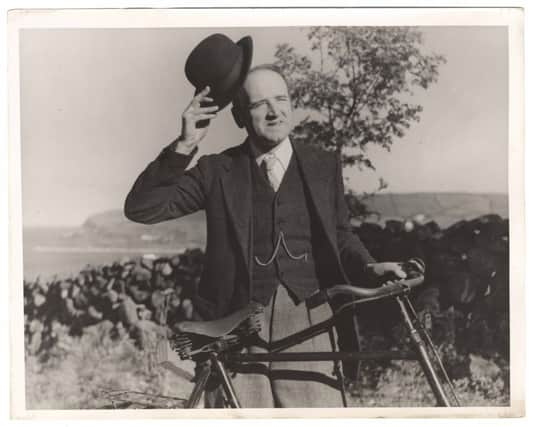Richard Hayward’s Coleraine connection


Richard Hayward was a pivotal cultural figure in the middle decades of twentieth-century Ireland.
His distinctive presence and unique voice made him one of the most popular singers and actors of his generation. He sang both traditional Irish songs and Orange ballads. In his writing he explored aspects of Irish cultural history and was a broadcaster and folklorist.
Advertisement
Hide AdAdvertisement
Hide AdHayward was born in Southport, Lancashire but his family moved to Ireland when he was a baby and he grew up in Larne. He later lived in Belfast and devoted his days to promoting Ireland. He appeared in early Irish films and drove around the country from the late 1930s up to the early 1960s gathering material for his books.


Between 1938 and 1964 he wrote eleven travel books about Ireland. For his first travel book, In Praise of Ulster published in 1938 he included a four-page historical section on Coleraine. He described it as ‘a very neat, pleasant and friendly town’, where he said ‘there is no lack of lovely girls to take the place of ‘Kitty of Coleraine’.
Apart from his travel writing, Hayward was also an actor and pioneering filmmaker who laid the foundations of the Irish film industry. He was acknowledged as a talented character actor and starred in some of the first black-and-white ‘talkies’ made in Ireland. Crowds queued to see these low-budget films in which he took on the lead role. They included his most successful one The Luck of the Irish (1935) which was received well in both Ireland and the U.S. Another of his popular films The Early Bird, made in 1936, was based on a story written by the Coleraine-born author and dramatist James Douglas. This was a film version of a play that Hayward had staged at the Empire Theatre in Belfast.
Hayward also made films of his Irish journeys, producing The Voice of Ireland in 1932, a photographic study of the four Irish provinces through the seasons in which he sang ‘The Girls of Coleraine’. In 1935 he appeared in Irish Travelogue and in a memorable section is seen merrily walking through the streets of the town with three women on each arm. He was also featured sitting on the honeycomb seat of the wishing chair at the Giant’s Causeway.
Advertisement
Hide AdAdvertisement
Hide AdIn the final years of his life Hayward received awards including an honorary degree which was conferred on him by Lafayette College in Pennsylvania in June 1959. The citation stated that his doctorate was awarded for ‘distinguished services to Irish literature’ and in recognition of his contribution to the development and spread of Irish literature.


His tragic death in a car accident at Cromkill near Ballymena on 13 October 1964, in which two other people were also killed, was widely reported in the press.
A series of events is being held in commemoration of the fiftieth anniversary of his death and a process of rediscovery is underway. For the first time his extraordinary life story has been told in a biography and a one-hour documentary on Hayward will be shown on BBC Northern Ireland television on Sunday, October 12.
The Linen Hall Library in Belfast is holding a free day-long symposium on Hayward on 24 October.
Advertisement
Hide AdAdvertisement
Hide AdRomancing Ireland, Richard Hayward, 1892-1964 by Paul Clements is available from Waterstones bookshop in Coleraine, Roughans in Portstewart or direct from the Lilliput Press at £20 post free anywhere in Ireland: www.lilliputpress.ie. For details of the symposium at the Linen Hall Library go to: www.linenhall.com